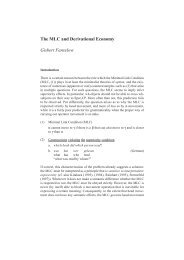Differential subject marking in Polish: The case of Genitive vs ...
Differential subject marking in Polish: The case of Genitive vs ...
Differential subject marking in Polish: The case of Genitive vs ...
You also want an ePaper? Increase the reach of your titles
YUMPU automatically turns print PDFs into web optimized ePapers that Google loves.
processes and entail<strong>in</strong>g an agent participant. However, there are <strong>case</strong>s <strong>in</strong> which p<strong>of</strong>ective forms<br />
are derived from imperfective verbs denot<strong>in</strong>g only states, as, e.g., siedziec ‘sit’ → posiedziec ‘sit<br />
for a while’; lezec ‘lie’ → polezec ‘lie for a while’; byc ‘be’ → pobyc ‘be for a while’. 43 To<br />
account for this fact, Piñón (1994:347) assumes that some stative verbs like siedziec, lezec or byc<br />
are thus ambiguous between process and stative read<strong>in</strong>gs, depend<strong>in</strong>g on whether the <strong>subject</strong><br />
argument is animate or not; cf. (36). 44 On their process read<strong>in</strong>g such verbs entail an agent<br />
participant that controls the <strong>in</strong>itiation and term<strong>in</strong>ation <strong>of</strong> a process denoted by the given verb,<br />
thus comply<strong>in</strong>g with the condition on p<strong>of</strong>ective formation <strong>in</strong> (37) (Piñón 1994:348).<br />
(36) a. # Moja ksiazka pobyla wczoraj u Irenki.<br />
my bookNOM was yesterday at Irenka<br />
‘My book was at Irenka’s place for a while yesterday.’<br />
b. Bozenka pobyla wczoraj u Irenki.<br />
BozenkaNOM was yesterday at Irenka<br />
‘Bozenka was at Irenka’s place for a while yesterday.<br />
(37) P<strong>of</strong>ective po- applies to any imperfective verb that<br />
a. denotes a property <strong>of</strong> processes<br />
b. entails an agent participant<br />
Now, given that it is possible to form a p<strong>of</strong>ective form from byc, we have evidence that byc can<br />
<strong>in</strong> fact have an agentively <strong>in</strong>terpreted nom<strong>in</strong>al argument. Importantly, though, such an agentive<br />
<strong>in</strong>terpretation is totally <strong>in</strong>compatible with a GEN marked nom<strong>in</strong>al argument (cf. (38)), which<br />
shows once aga<strong>in</strong> that the GEN is <strong>in</strong> a sense a marker <strong>of</strong> nonagentivity (see the discussion<br />
above).<br />
‘John read the book (for a while) yesterday.’<br />
43 This does not mean, however, that p<strong>of</strong>ective forms can be derived from any stative verb (stative verbs like,<br />
e.g., miec ‘have’, lubic ‘like’ or znac ‘know’ do not have p<strong>of</strong>ective forms; cf. Piñón 1994:347).<br />
44 See also Lev<strong>in</strong> and Rappaport Hovav (1995:126ff.), who dist<strong>in</strong>guish three different mean<strong>in</strong>gs for verbs <strong>of</strong><br />
spatial configuration, such as sit, stand, lie: (i) the ma<strong>in</strong>ta<strong>in</strong> position sense, which is an agentive noncausative<br />
mean<strong>in</strong>g that describes the ma<strong>in</strong>tenance <strong>of</strong> a particular spatial configuration by an animate be<strong>in</strong>g, as <strong>in</strong> Yvonne<br />
stood alone (<strong>in</strong> the hallway) for six hours; (ii) the assume position sense, which is an agentive noncausative<br />
mean<strong>in</strong>g that describes an animate be<strong>in</strong>g com<strong>in</strong>g to be <strong>in</strong> a particular position under his or her own control, as<br />
<strong>in</strong> Yvonne stood (up); and (iii) the simple position mean<strong>in</strong>g, which is a nonagentive noncausative mean<strong>in</strong>g <strong>in</strong><br />
30

















